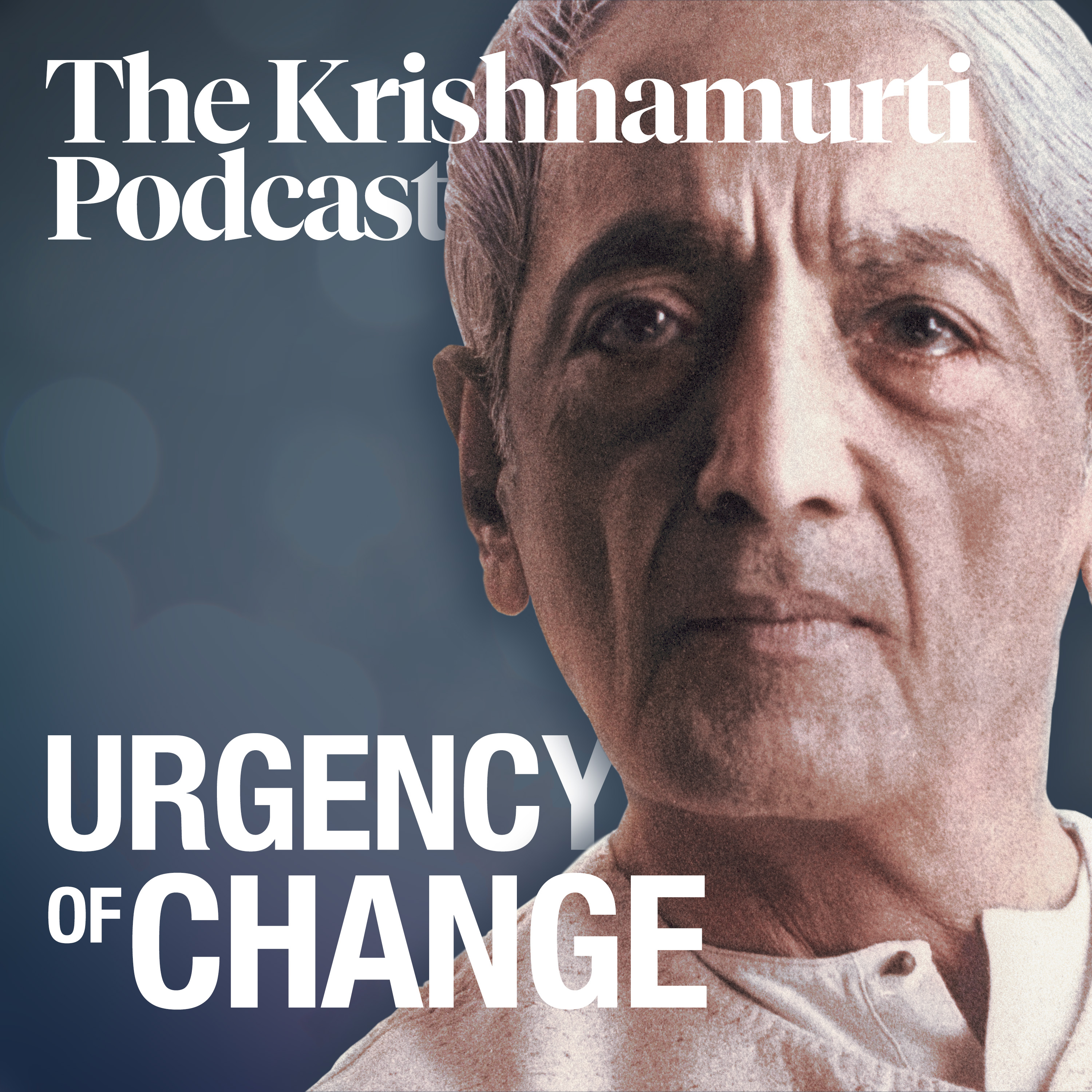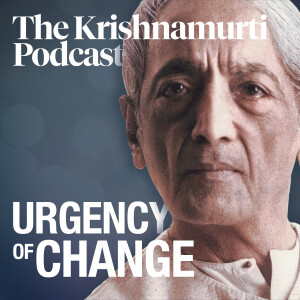
What are you doing with your life? Can anyone show you the way, or must you be a light to yourself? Do we see the urgency of change? One of the greatest spiritual teachers and philosophers of all time, J. Krishnamurti challenges us to question all that we know and discover our true nature in the here and now. This official podcast from Krishnamurti Foundation Trust now has over 250 episodes. Episodes 1-50 feature conversations between Krishnamurti and luminaries from many paths, along with readings of the classic book Commentaries on Living by actor Terence Stamp. Episode 51 onwards features carefully chosen extracts based on a theme explored by Krishnamurti. The extracts from our archives have been carefully selected to represent his different approaches to each of these universal and timelessly relevant themes. Get in touch at podcast@kfoundation.org. Please consider leaving a review, which helps the visibility of the podcast.
Episodes

Wednesday Sep 30, 2020
Krishnamurti on Time
Wednesday Sep 30, 2020
Wednesday Sep 30, 2020
This week’s podcast has four sections. The first extract, starting at 2:10, is from Krishnamurti’s first talk in Rajghat 1984, titled The future is now
The second extract, starting at 12:30, is from the third talk in Ojai 1980, titled Your consciousness is the essence of time
The third extract, starting at 28:36, is from the forth talk at Brockwood 1973, titled Thought is time as movement
The final extract this week, starting at 51:19, is from the sixth talk in Saanen 1978, titled When you understand death, time has come to an end
This episode is the fifth in the new season of the Krishnamurti podcast. Each weekly episode is based on a major theme of Krishnamurti’s teachings, such as self-knowledge, authority, beauty and meditation. Extracts from our extensive archives have been carefully selected to represent Krishnamurti’s different approaches to each of these universal and timelessly relevant themes.
Find us online at kfoundation.org and on social media as Krishnamurti Foundation Trust

Wednesday Sep 23, 2020
Krishnamurti on Confusion
Wednesday Sep 23, 2020
Wednesday Sep 23, 2020
This week’s podcast has two sections. This first, longer, extract (starting at 2:16) is from Krishnamurti’s third talk in New York 1966, titled Action born of confusion leads to more confusion.
The second, shorter, extract (starting at 1:00:40) is from the fourth talk in Madras 1970, titled Confusion tells its own story.
This episode is the fourth in a new season of the Krishnamurti podcast. Each weekly episode is based on a major theme of Krishnamurti’s teachings, such as self-knowledge, authority, beauty, death and meditation. Extracts from our extensive archives have been carefully selected to represent Krishnamurti’s different approaches to each of these universal and timelessly relevant themes.
Find us online at kfoundation.org and on social media as Krishnamurti Foundation Trust

Wednesday Sep 16, 2020
Krishnamurti on Passion
Wednesday Sep 16, 2020
Wednesday Sep 16, 2020
This episode is the third in the new season of the Krishnamurti podcast. Each weekly episode is based on a major theme of Krishnamurti’s teachings, such as self-knowledge, authority, beauty, death and meditation. Extracts from our extensive archives have been carefully selected to represent Krishnamurti’s different approaches over the years to each of these universal and timelessly relevant themes.
This week’s podcast has four sections. The first extract (starting at 2:07) is from Krishnamurti’s fourth talk in Madras 1964, titled We have killed passion.
The second extract (starting at 29:12) is from the second talk in New Delhi 1970, titled Out of sorrow comes passion.
The third extract (starting at 34:45) is from the third talk in Bombay 1974, titled Compassion means passion for all.
The final extract this week (starting at 45:23) is from the fourth talk in Madras 1967, titled Without passion there is no love.
Find us online at kfoundation.org and on social media as Krishnamurti Foundation Trust

Wednesday Sep 09, 2020
Krishnamurti on Images
Wednesday Sep 09, 2020
Wednesday Sep 09, 2020
This episode is the second in the new season of the Krishnamurti podcast. Each episode, released each week, is based on a major theme of Krishnamurti’s teachings, such as freedom, self-knowledge, authority, beauty, death and meditation. Extracts from our extensive archives have been carefully selected to represent Krishnamurti’s different approaches over the years to each of these universal and timelessly relevant themes.
This week’s podcast has three sections. The first extract (starting at 2:11) is from Krishnamurti’s first talk in Bombay 1966, titled To establish right relationship is to destroy the image.
The second extract (starting at 39:44) is from the fourth talk in Ojai 1977, titled Observing without the image
The final extract this week (starting at 50:46) is from the first talk in New York City 1974, titled In attention there is no image
Find us online at kfoundation.org and on social media as Krishnamurti Foundation Trust

Wednesday Sep 02, 2020
Interview by Bernard Levin
Wednesday Sep 02, 2020
Wednesday Sep 02, 2020
This interview with Krishnamurti was first broadcast in 1981. Recorded at Brockwood Park in Hampshire, as part of The Levin Interview TV series, it serves as a good introduction to Krishnamurti’s work. Bernard Levin was one of Britain’s best-known journalists. Questions explored include: Why don't we realise the damage we are doing in the world? Is it wrong to seek happiness? What is action? What is right living? Can society be changed? How is man to be free?
Find us online at kfoundation.org and on social media as Krishnamurti Foundation Trust

Wednesday Sep 02, 2020
Krishnamurti on Listening
Wednesday Sep 02, 2020
Wednesday Sep 02, 2020

Wednesday Aug 26, 2020
Terence Stamp reading Commentaries on Living – Part 7
Wednesday Aug 26, 2020
Wednesday Aug 26, 2020
Commentaries on Living is one of Krishnamurti’s most well-known and best loved books. In it, he recalls many of the private conversations with those who came to see him. With encouragement from Aldous Huxley these meetings were written down by Krishnamurti and published in 1956. Two further volumes were published in 1958 and 1960.
Chapters included in this episode are titled Silence, Renunciation of Riches, Repetition and Sensation, The Radio and Music, Authority, Meditation, and Anger.
Terence Stamp is an Oscar-nominated actor, known for his roles in The Limey, Superman, The Collector, Wall Street and many others. It was through working with Fellini that he met and became friends with Krishnamurti. Stamp includes his experiences with Krishnamurti in his recent memoir The Ocean Fell Into the Drop.
Find us online at kfoundation.org and on social media as Krishnamurti Foundation Trust

Wednesday Aug 19, 2020
Conversation with Alain Naudé 7 – Religion and Meditation
Wednesday Aug 19, 2020
Wednesday Aug 19, 2020
This conversation between Krishnamurti and Alain Naude was recorded in Malibu, California, in 1972. Subjects include:
Is there any connection between the supernatural and religion?
Is a religious life to lead a good life?
A religious life is a life in which the self is not.
We get caught in the so-called mysterious. But when the self is not, there is a greater, vaster mystery.
Self-knowing is much more important than acquiring some kind of power.
What place has meditation in religious life?
Meditation is not control or a practice, it is not an effort to achieve an experience or to remain in a particular state of consciousness.
If the self is, the religious life is not. Can one dissolve the self?
Why are certain human beings entrenched in the myth of Jesus or Krishna?
Attachment destroys freedom.
Where there is freedom there is joy. It is that quality of mind that has this sense of joy and freedom that perceives.
Meditation means freedom and joy to observe, without any attachment or partial perception.
Alain Naude was Krishnamurti’s private secretary in the 1960s. He met Krishnamurti in 1963 whilst a music lecturer and concert pianist. He gave up his teaching and performing in 1964 to work with Krishnamurti. Fluent in several languages, he was very helpful at international gatherings and in attracting younger audiences to Krishnamurti’s talks, at a time of cultural change in the West.
Find us online at kfoundation.org and on social media as Krishnamurti Foundation Trust

Wednesday Aug 12, 2020
Conversation with Ravi Ravindra – Is death a matter of continuity, or ending?
Wednesday Aug 12, 2020
Wednesday Aug 12, 2020
This conversation between Krishnamurti and Ravi Ravindra was recorded in Ojai, California, in 1985. The inquiry includes:
What do we mean by energy?
The brain has tremendous energy.
Is it possible for me to know what happens when I die, without inventing theories?
Is all I have collected different from the ‘I’?
The world is in disorder and 99% of people are disorderly.
We rarely ask what death is. What does it mean to die? How do you find out?
Ravi Ravindra was born in India and later moved to Canada. He holds a Ph.D. in physics and an M.A. in philosophy, and is professor of Comparative Religion at Dalhousie University in Nova Scotia. He met Krishnamurti in the 1960s and the two met formally and informally over the years. Among his many books, Two Birds on One Tree and Centred Self, focussing on his time with Krishnamurti.
Find us online at kfoundation.org and on social media as Krishnamurti Foundation Trust

Wednesday Jul 29, 2020
Terence Stamp reading Commentaries on Living – Part 6
Wednesday Jul 29, 2020
Wednesday Jul 29, 2020
Commentaries on Living is one of Krishnamurti’s most well-known and best loved books. In it, he recalls many of the private conversations with those who came to see him. With encouragement from Aldous Huxley these meetings were written down by Krishnamurti and published in 1956. Two further volumes were published in 1958 and 1960. Chapters included in this episode are titled ‘The Known and the Unknown’, ‘The Search for Truth’, ‘Sensitivity’, ‘The Individual and Society’, ‘The Self’, and ‘Belief’.
Terence Stamp is an Oscar-nominated actor, known for his roles in The Limey, Superman, The Collector, Wall Street and many others. It was through working with Fellini that he met and became friends with Krishnamurti. Stamp includes his experiences with Krishnamurti in his recent memoir The Ocean Fell Into the Drop.
Find us online at kfoundation.org and on social media as Krishnamurti Foundation Trust
